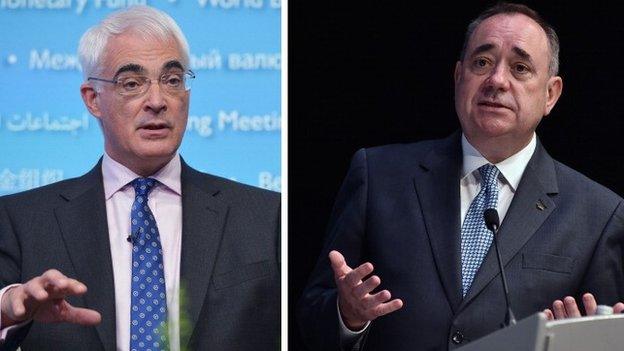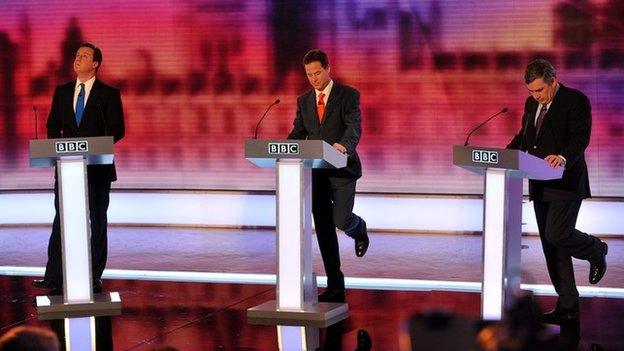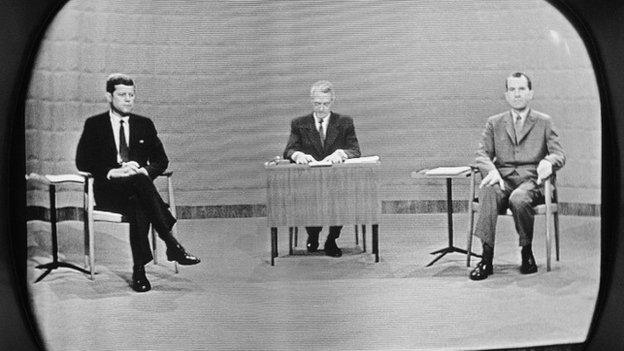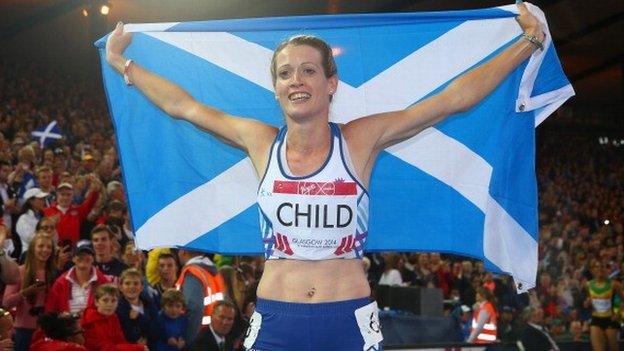Scottish independence: Do political TV debates matter?
- Published

Scotland's First Minster Alex Salmond will face head of Better Together campaign Alistair Darling in a live televised debate on Scottish independence later. It will be broadcast by STV in Scotland and online. But do TV debates influence voters?
It's been billed as the most important piece of televised political theatre in Scotland's history.
For two hours between 20:00 BST and 22:00 BST, the figureheads of the "Yes" and "No" campaigns will participate in a head-to-head showdown in a bid to win over hearts and minds before the referendum on 18 September, when voters will be asked the yes/no question: "Should Scotland be an independent country?"
There's already been drama over the line-up. Mr Salmond repeatedly called for UK Prime Minister David Cameron to face him in the debate, calling him "feart" when he rejected the invitation. Mr Cameron said as leader of the pro-UK campaign, Mr Darling was the man for the job.
Then there was a wrangling over the date. Now there's the much-anticipated spectacle of a live debate. A silver-tongued swipe at the opposition can gain admiration. An ill-timed stumble or an embarrassing gaffe can send a campaign into an tailspin.
Both protagonists have experience in the field. The leader of the SNP faced other Scottish party leaders in a debate before the Holyrood elections in 2011 and Mr Darling has been a familiar face on the small screen as a former Scotland Secretary and Chancellor of the Exchequer.
But how much do televised debates matter?
Tom Mludzinski, head of political polling at ComRes - which organised the responsive "worm" that tracked audience reactions to the leaders' debates before the general election in 2010 - says the one thing TV debates guarantee is a wider audience - "viewers who wouldn't normally watch political programmes".
"It can be a particular help where things are unknown - that's what we saw with Nick Clegg [ahead of the 2010 British general election]. He had a much lower profile back then, and that exposure created the 'I agree with Nick' phenomenon and so-called Clegg-mania," he says.

The 2010 leaders' debates prompted a (short-lived) outbreak of people declaring: "I agree with Nick."
Following that logic, Mr Mludzinski argues that "there is more to gain for Darling, who's perhaps less well-known as an orator and has the chance to make a good impression".
However, Scott Macnab, a political correspondent for the Scotsman, says the SNP leader will also be hoping to gain some ground.
"The polls are against Alex Salmond. He's the one who really has to make it happen. If Mr Darling and Mr Salmond came out level-pegging, I suspect the Better Together people would be pretty happy with that. For Alistair Darling, it's a case of damage limitation," he says.
There is also more of a risk of Mr Salmond's personality eclipsing the campaign on the "Yes" side, he argues, since the first minister is "a love-hate figure".
"He will have to show that independence will be better for the people of Scotland - in terms of the economy, healthcare et cetera - in order to avoid it being a referendum on Alex Salmond," he says.
But if either man turns out to be a smash hit with viewers, would it make people more likely to vote for their cause? And would a gaffe have the opposite impact?
Mr Clegg's rating jumped from just under 20% to fluctuating between 28% and 33% after the three televised leader debates before the British general election, but his TV appearance didn't translate into as many votes as he might have hoped - the Lib Dems went from 62 seats to 57.
But the public response to his performance was "useful all the same", Mr Mludzinski says, "since it helped give him the credibility he needed going into the negotiations that led to the coalition being formed".
Some televised debates across the Atlantic in the US - where they are more widespread - have had more impact.

TV debates are more likely to make a difference where the race is very close, as in the US presidential election of 1960.
Texas governor Rick Perry was a much-fancied contender in the 2011 race for the Republican nomination before he decided to list the three government departments he would axe if he made it to the White House in a TV debate. The trouble was, he could only remember two of them. He withdrew from the race shortly afterwards.
And in the first US presidential TV debate in 1960, Republican nominee Richard Nixon famously lost out on the presidency after many thought he appeared sweaty and shifty next to a polished and confident John F Kennedy.
However, Kathleen Hall Jamieson, a professor of communication at the University of Pennsylvania, says in general, TV debates in the US "don't have a great deal of impact on the way people vote".
"Where it does make a difference is for the minority of voters who've not made up their minds or who don't have strong partisan ties - and also where the race is very close," she says.
In the case of the referendum, Mr Macnab thinks it will be difficult for either side to produce a trump card to woo the undecided since "everything's already out there" - something that those that feel there are still many unanswered questions would challenge.

Better than politics? Scotland's Eilidh Child gets silver at the Commonwealth Games.
But if debates only make a difference in a small number of cases, why do broadcasters and politicians hold them?
In addition to trying to reach and inform more voters, they also help make politicians more accessible and give an insight into how they might deal with different policies, Prof Jamieson argues.
"While they might not make people switch sides, we know debates help people learn how candidates would govern and how they would handle certain issues - they're very useful in tying campaigns to governance," he says.
So would Scots like to see their politicians on TV more often?
Mr Macnab is sceptical.
"It's been a very long campaign and most people are getting a little weary of it. Watching the Commonwealth Games has been a welcome break," he says.
The debate's viewing figures might be the best indicator of how many people are engaged - or have already switched off.


A referendum on whether Scotland should become independent is to take place
People resident in Scotland will be able to take part in the vote, answering the "yes/no" question: "Should Scotland be an independent country?"
The referendum will take place on Thursday, 18 September 2014
Go to the BBC's Scotland Decides page for analysis, background and explainers on the independence debate.

The debate will be shown on STV on Tuesday 5 August at 20:00 BST.